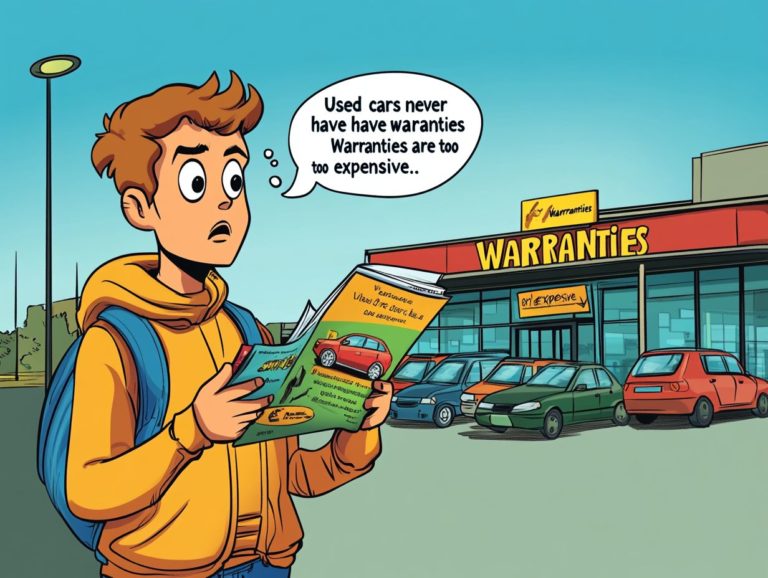How to Choose Between Warranty Providers
Knowing about warranties can save you money and stress! Warranties serve as a valuable safeguard for your purchases. Navigating their complexities can feel daunting, but this article simplifies the process. Here, you ll learn what warranties are, the types available, and crucial factors to consider when selecting the right warranty provider.
You will also find essential questions to ask before making a decision. This ensures you choose a plan that aligns with your needs and provides that all-important peace of mind.
Dive in and equip yourself with the knowledge necessary to make informed choices!
Contents
Key Takeaways:

- Consider the coverage and exclusions of a warranty before choosing a provider. It’s important to know exactly what is covered and what is not to avoid any surprises down the road.
- Take into account the cost and payment options of a warranty provider. Choose a plan that fits your budget and offers flexible payment options.
- Research the customer service, support, and reputation of a warranty provider before making a decision. You want a provider that is reliable, responsive, and has a good track record of satisfied customers.
Understanding Warranties
Warranties are essential for you as a consumer aiming to protect your vehicle, particularly in the auto industry. Reliable coverage can greatly influence your financial well-being.
A warranty is a commitment from a manufacturer or service provider to cover specific repair costs. This offers you peace of mind as a vehicle owner. It can include features like full protection against most repairs, roadside assistance, and rental car reimbursement. These factors are invaluable in today’s fast-paced world, where concerns about unforeseen expenses loom large.
By grasping the intricacies of warranties, you empower yourself to make informed decisions and enhance your overall customer experience.
What is a Warranty?
A warranty serves as a formal guarantee from a manufacturer or service provider. It details the conditions under which they will repair or replace a product, including vehicles. This commitment is designed to ensure your satisfaction through dependable coverage.
This assurance builds trust between you and the provider. It also plays a crucial role in the marketplace, safeguarding you against unexpected costs associated with defective products. Warranties can vary significantly in scope, including limited and full warranties and extended options (additional coverage once the manufacturer s protection lapses).
Understanding these distinctions is vital, especially when navigating the sometimes intricate claims process. By familiarizing yourself with your rights within these protections, you empower yourself to make informed decisions, ultimately enhancing your satisfaction and confidence in your purchases.
Types of Warranties
You ll find a variety of warranties designed to cater to your needs as a vehicle owner. Each type covers different aspects of service. These include comprehensive options for new and used cars, as well as specialized vehicle service contracts that shield you from unexpected repair costs.
Understanding these choices can significantly enhance your vehicle ownership experience while minimizing financial risks. A manufacturer’s warranty typically accompanies the purchase of a new car, offering assurance against defects and malfunctions during the initial period.
An extended warranty allows you to secure additional coverage once the manufacturer s protection lapses, granting you peace of mind for the years to come.
Aftermarket automotive warranties and service contracts present flexible alternatives. They often feature specific benefits tailored to your individual needs, such as roadside assistance and rental car coverage. This approach ensures that you remain protected, regardless of the situation that may arise.
Explore your warranty options today to find the plan that fits you best!
Factors to Consider When Choosing a Warranty Provider

When choosing a warranty provider, it’s crucial to weigh several factors that can significantly influence your satisfaction and financial security, including how to choose the right extended warranty.
Pay attention to customer reviews. Explore the coverage options available, evaluate the cost and payment plans, and be mindful of any exclusions that might apply to the warranty. Each of these elements plays a vital role in ensuring you make a well-informed decision.
Coverage and Exclusions
Coverage and exclusions are essential components of any warranty, showing what s included in your policy and what isn t.
This distinction can significantly influence both how to file a claim and your overall experience as a customer.
Understanding these details is crucial for anyone looking to get the most out of their warranties. Common inclusions usually cover defects in materials and workmanship, granting you peace of mind.
Conversely, typical exclusions may cover damages resulting from misuse or natural wear and tear, potentially leading to unexpected out-of-pocket costs.
When you know these details, you often navigate the claims process with greater ease, minimizing frustration when issues arise.
Ultimately, having clarity on coverage empowers customer service representatives to assist you more effectively, enhancing your satisfaction and building trust in your warranty provider.
Cost and Payment Options
Evaluating the cost and payment options of a warranty is crucial for ensuring your long-term financial stability while also achieving high levels of satisfaction with your chosen warranty provider.
Warranties come with a range of price tags, which can significantly influence your decision-making process.
Some options allow for a one-time upfront fee, perfect for those who prefer straightforward budgeting.
On the other hand, you might appreciate the flexibility of monthly payments, which can alleviate financial strain and make the investment more manageable over time.
By understanding the available payment plans and how they affect overall costs, you can select a warranty that not only meets your needs but also fits seamlessly into your financial landscape.
Customer Service and Support
The quality of customer service and support from a warranty provider is pivotal to your overall experience, influencing everything from claims denials to the ease of navigating the claims process.
When you can easily reach out for assistance, it shapes your perception of the service.
Exceptional customer service ensures that you feel supported and well-informed during the often stressful and confusing claims journey.
With dedicated representatives available to address your queries and provide guidance, the likelihood of a smoother resolution increases dramatically.
Access to comprehensive resources, such as FAQs and online portals, empowers you to grasp your coverage better and prepare for potential claim scenarios, ultimately fostering trust and satisfaction.
Reviews and Reputation

Checking reviews helps you choose a reliable warranty provider, as these insights reveal customer ratings and experiences, guiding you to make informed decisions.
By examining platforms like Trustpilot, you can assess the reliability and integrity of various warranty options.
Customer reviews often shed light on important factors such as claim processing efficiency, responsiveness, and overall satisfaction with the service.
This collective feedback serves as a valuable benchmark, empowering you to differentiate between providers that genuinely prioritize their clients and those that may not live up to expectations.
In an industry where experiences can fluctuate dramatically, leveraging third-party ratings is essential for selecting a warranty provider. It’s also important to consider what to keep in mind when purchasing a warranty to ensure it meets your needs and expectations.
Questions to Ask Before Choosing a Warranty Provider
Make sure to ask key questions before you choose a warranty provider. Ask about what s covered, costs, the claims process, and any exclusions that could impact your warranty experience.
Taking this step will help ensure you make an informed decision that aligns with your needs.
What is Covered?
Understanding the details of a warranty, which is a promise that certain repairs will be paid for, is essential. It directly impacts the protection you have against unexpected repair and medical costs associated with vehicle services.
A well-structured warranty typically covers various components, including the engine, transmission, and electrical systems, granting you peace of mind. Vehicle service contracts often go above and beyond standard warranties by offering additional coverage for routine maintenance, roadside assistance, and even rental car reimbursement during repair periods.
These contracts don t just focus on major repairs; they can also address potential medical expenses linked to accidents or mishaps. Knowing this helps you make better claims and navigate potential claims more effectively, ensuring that you receive the comprehensive protection you truly deserve.
How Much Does it Cost?
Understanding the cost of a warranty is crucial for you, as it can greatly influence how well you can handle money and your ability to handle unexpected repair expenses with ease.
Warranty costs can fluctuate, offering various structures such as upfront fees or monthly payment plans tailored to your unique financial circumstances. While an upfront payment might feel overwhelming, it can sometimes lead to savings compared to spreading the costs over time.
Conversely, choosing a payment plan can alleviate immediate financial pressure, but it might also result in higher long-term expenses. Evaluate these options to improve your finances and streamline the claims process, ensuring you re well-prepared for any unexpected incidents without the burden of financial stress.
What is the Claims Process?

The claims process is an important part of any warranty agreement, shaping how you can seek repairs or replacements and significantly impacting your satisfaction, especially when faced with potential claims denials.
Navigating this process with finesse can truly transform your experience, as it often hinges on grasping the specific steps involved.
- First, you need to gather all relevant documentation, including purchase receipts and warranty policies, before reaching out to customer service. This step is essential; incomplete or unclear submissions can result in claims denials, leaving you feeling frustrated and unheard.
You may also encounter coverage exclusions that limit what the warranty will cover, adding another layer of complexity to the journey. By proactively communicating with customer service representatives, you can clarify any doubts and avoid common pitfalls, ensuring you feel supported every step of the way during your claims process.
Are There Any Exclusions?
Exclusions in a warranty can significantly shape the protections available to you, making it essential to grasp these limitations fully to avoid unpleasant surprises during the claims process.
These exclusions can vary widely, from specific components not being covered, like batteries or cosmetic damages, to limitations on the duration of coverage itself. For example, many warranties do not account for wear and tear, meaning if an appliance malfunctions solely due to age-related deterioration, you may find yourself without recourse.
Understanding these exclusions not only aids you in making informed purchasing choices but also enhances your overall experience when navigating the often convoluted claims process. Don t miss out on critical coverage! Being aware of what isn t covered allows you to approach warranty claims with realistic expectations, ultimately leading to a smoother resolution.
What is the Provider’s Reputation?
Assessing a warranty provider’s reputation is essential. It offers valuable insights into the reliability of the warranty, the quality of customer service, and overall customer satisfaction from real experiences.
By diving into customer reviews and ratings on platforms like Trustpilot, you can get a sense of how previous customers have interacted with the warranty provider. This careful analysis reveals patterns related to responsiveness, the claims process, and overall satisfaction following a purchase.
Exploring customer experiences empowers you to make well-informed choices. Ultimately, understanding the reputation of warranty providers not only helps you secure a dependable warranty but also enhances your peace of mind, ensuring that any potential issues are resolved effectively and efficiently.
Frequently Asked Questions
How do I choose between warranty providers?
1. Consider your needs: Before choosing a warranty provider, assess your needs and priorities. What type of coverage do you need? What is your budget? Reviewing the best warranty providers can help guide your decision.
2. Research the provider’s reputation: Look into the reputation of the warranty provider through reviews and personal recommendations, including resources like understanding car warranty comparisons.
3. Compare coverage and pricing: Make sure to evaluate warranty coverage and pricing of different warranty providers. Some may offer more comprehensive coverage, while others may be more budget-friendly.
4. Check for what s not covered: Be aware of any aspects that are not included in the warranty coverage. Some providers may have certain restrictions or limitations that could affect your decision.
5. Look for additional benefits: Some warranty providers may offer extra perks such as roadside assistance or rental car coverage. Consider these when making your decision.
6. Read the fine print: Before finalizing your decision, carefully read and understand the terms and conditions of the warranty. Look for any hidden fees and ask for clarification if needed.
Don t wait! Start your search for the best warranty today!




